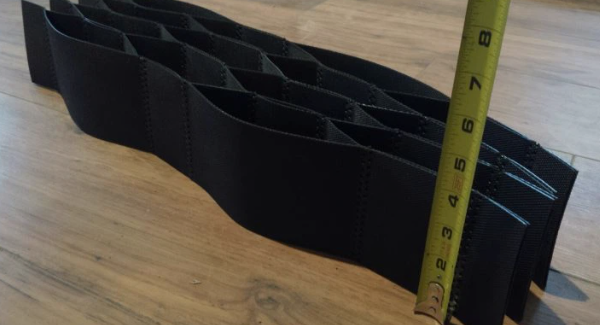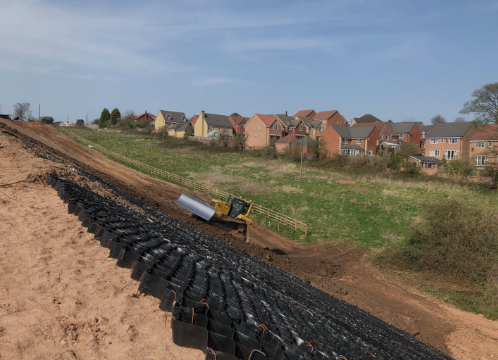- Understanding the Role of Geomembrane Liners in Waste Management
- Innovations in Geomembrane Liners for Water Management
- Geomembrane Liners: A Comprehensive Guide
- The Future of Geomembrane Liners in Civil Engineering
- Geomembrane Liners: Enhancing Landfill Stability
Manager:
WhatsApp:+86 177 0135 2670
Tel:+86 177 0135 2670
Email:marketing@okorder.com
Address:3rd Floor, No.2 Building, No.1 Sanlihe Road
What is geocell used for?
Geocell slope protection and slope protection geocell have become integral solutions in modern engineering for addressing slope stability and erosion control. From highway embankments to retaining walls, these innovative geosynthetic materials offer a versatile and effective means of safeguarding landscapes against the destructive forces of nature. But what exactly are geocells, and how are they utilized in slope protection applications?

Understanding Geocells: A Brief Overview
Geocells, also known as cellular confinement systems, are three-dimensional, honeycomb-like structures made from high-density polyethylene (HDPE) or other durable materials. These interconnected cells form a strong and flexible framework when filled with soil, aggregate, or concrete. The resulting structure provides reinforcement, confinement, and stabilization to the underlying soil or fill material.
The Role of Geocell Slope Protection
In the realm of slope protection, geocells serve several crucial functions. Firstly, they enhance the load-bearing capacity of soil on steep slopes, thereby reducing the risk of instability and erosion. Secondly, geocells act as a barrier against surface runoff, preventing soil erosion and sedimentation. Lastly, they promote vegetation growth by retaining moisture and providing a conducive environment for plant roots to establish and proliferate.
Applications of Slope Protection Geocell
One of the primary applications of slope protection geocell is in the construction of roadside embankments and cut slopes along highways and railways. These infrastructure projects often require effective erosion control measures to ensure the long-term stability and safety of the transportation corridor. Geocells offer a cost-effective and sustainable solution by reinforcing the soil structure and mitigating erosion risks.
Enhancing Slope Stability with Geocell Technology
Traditional methods of slope stabilization, such as riprap and concrete retaining walls, are often labor-intensive and environmentally disruptive. Geocell slope protection offers a more environmentally friendly alternative by promoting natural vegetation and minimizing disturbance to the surrounding ecosystem. Additionally, the flexibility of geocell systems allows engineers to adapt to varying slope angles and terrain conditions with ease.
Geocell Slope Protection in Environmental Restoration
Beyond infrastructure projects, geocells play a vital role in environmental restoration efforts. In areas affected by landslides, wildfires, or other natural disasters, geocell slope protection can help rehabilitate damaged slopes and prevent further soil erosion. By stabilizing the terrain and promoting revegetation, geocells contribute to the ecological recovery of affected ecosystems.
Advantages of Geocell Slope Protection
The use of geocells for slope protection offers numerous advantages over traditional methods:
1. Cost-effectiveness: Geocell installations require less material and labor compared to conventional retaining structures, resulting in cost savings for construction projects.
2. Versatility: Geocells can be tailored to suit a wide range of slope angles and soil types, making them suitable for various terrain conditions.
3. Environmental Sustainability: Geocells promote vegetative growth and minimize disturbance to natural habitats, aligning with principles of sustainable development.
4. Durability: Constructed from durable materials, geocells have a long service life and provide reliable slope protection over time.
5. Easy Installation: Geocell systems are relatively easy to install, reducing construction time and minimizing disruptions to ongoing operations.

Conclusion
Geocell slope protection represents a sustainable and effective solution for addressing slope stability and erosion control challenges in civil engineering and environmental restoration projects. By harnessing the inherent strength and flexibility of cellular confinement systems, engineers can create resilient and environmentally friendly slope protection measures that withstand the test of time. As the demand for innovative geosynthetic solutions continues to grow, geocells are poised to play an increasingly vital role in shaping the landscapes of tomorrow."






